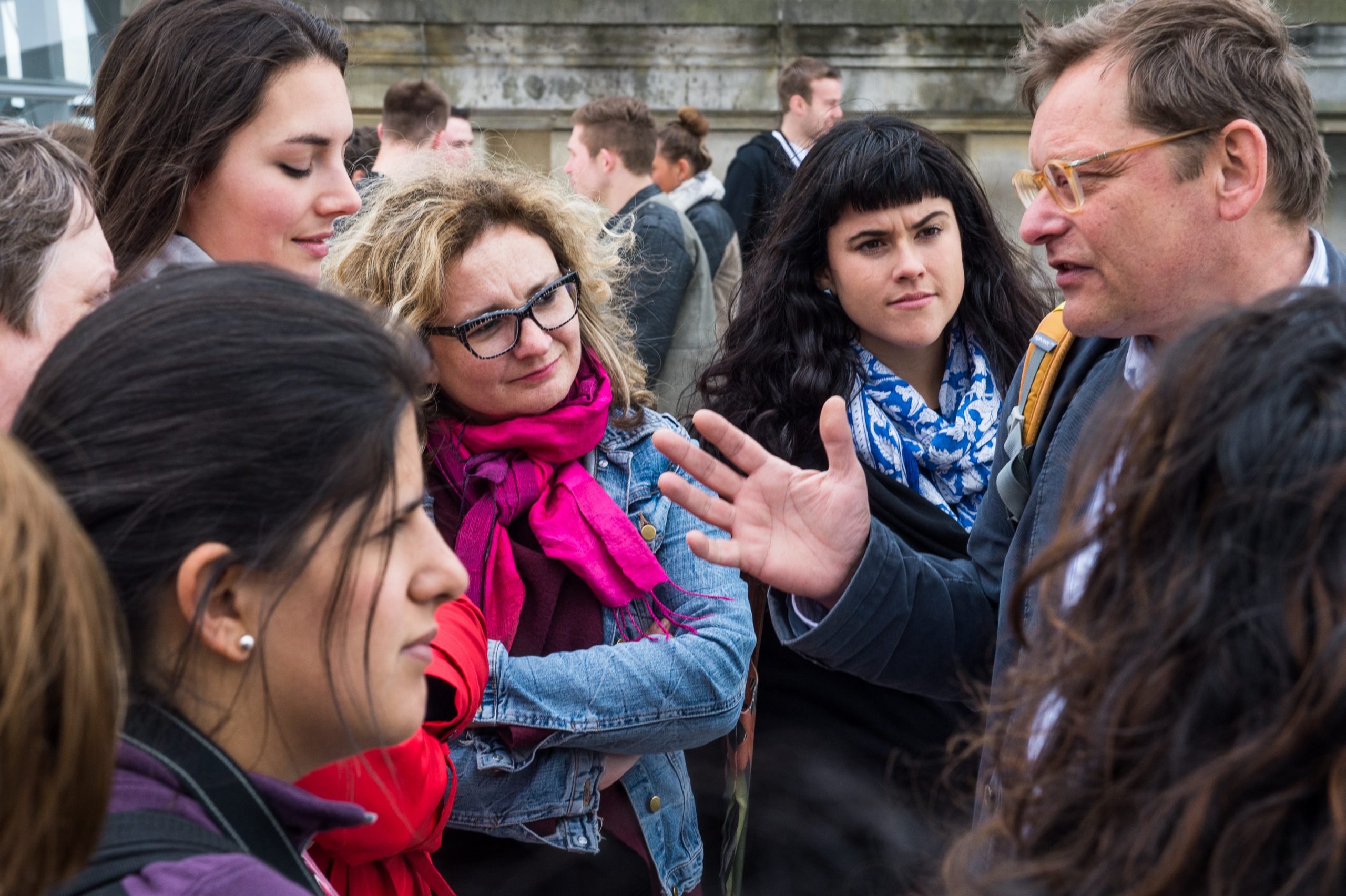
Sara Clarke-Habibi presents her research on transitional justice and education.
Under what conditions may learning about past violence succeed in preventing future human rights abuses and promote reconciliation in divided societies?
Sara Clarke-Habibi
Young people in Bosnia and Herzegovina should no longer be prevented from talking openly about the recent war and from taking up leadership roles to drive positive social and political change, a Gates Cambridge Scholar told an international meeting in Germany last month.
Sara Clarke-Habibi (2012) was selected from among 234 early career researchers to participate in the Georg Arnhold International Summer School on Education for Sustainable Peace, held in Braunschweig, Germany, from 22-27 June 2015.
In her paper on "Transitional Justice and Education: Lessons gleaned from genocide education", Sara discussed the moral, political and pedagogical dimensions of teaching children and youth about past atrocities. Drawing upon research into Holocaust education in American, British, Israeli and Palestinian schools she asked: ‘Under what conditions may learning about past violence succeed in preventing future human rights abuses and promote reconciliation in divided societies?’
The question is pertinent to Sara’s doctoral research into the role of education in Bosnia’s ongoing post-conflict social reconstruction and peacebuilding processes. Her findings show that while young people of all ethnicities in Bosnia and Herzegovina long to overcome the social divisions that have persisted in their country since the 1992-1995 war, they lack the sense of empowerment, moral support, optimism and opportunity to take the lead on promoting positive social change.
Ongoing war crimes trials remain daily news in the country 20 years after the war ended, but Bosnian students are prevented from discussing the war and its after-effects at school. Sara’s research found that today’s post-war generation of young Bosnians are worried about the culture of avoidance that governs education policy and their resulting vulnerability to ethnopolitical manipulation. At the same time, they resent being made to feel that they must inherit the guilt of the previous generation’s war.
Sara’s data came from interviews and focus groups with ethnically-diverse secondary school teachers and students at five schools in three cities.
The theme of the summer school was "Transitional Justice and Education: Engaging Children and Youth in Justice and Peacebuilding through Educational Media, Curricula and Outreach". Sara was one of only 18 early-career researchers from around the world to be given the opportunity to take part.
An unexpected finding in Sara’s work revealed educational inequities related to peacebuilding. Despite their willingness to build a socially cohesive and just multi-ethnic state, most Bosnian youth never get to participate in the many internationally-sponsored youth peacebuilding and transitional justice projects. The primary reason: faulty ‘multiplier-effect’ theories that lead project designers and funders to focus scarce resources on a handful of (often the same) delegates from a select number of elite schools, rather than engaging whole school communities in peacebuilding, including technical and vocational schools at which the majority of young Bosnian citizens are educated.
Her work shows that exposing young people to histories of atrocity without simultaneously engaging them in future-oriented follow-up to ‘build society better’ leads to youth distress, disempowerment and cynicism. She argues that Bosnian young people have the right to discuss their country’s recent history, but that teachers also need more support to channel critical inquiry towards empathy, respect for diversity, inclusion, hope and positive social action. She called for a more holistic study of the country’s war-torn past, including a focus on both how and why crimes against humanity occurred and on the everyday suffering, survival and humanitarianism that characterised the lives of ordinary citizens during the war.
The summer school was hosted by the Georg Eckert Institute for International Textbook Research (GEI) and the International Center for Transitional Justice (ICTJ) which works to help societies in transition address legacies of mass human rights violations and build civic trust in state institutions as protectors of human rights. The week-long programme focused on the role of educational media, curricula, pedagogies and diverse actors such as teachers, NGOs, UN bodies, communities and governments in supporting and counteracting transitional justice attempts to come to terms with past conflict and violence.
Other participants shared research on models of transitional justice education in South Africa, Colombia, Rwanda, Argentina, Kenya, Germany and countries of the Former Yugoslavia. Together they reflected on lessons learned and explored innovative ways to help children and youth think critically about how and why mass human rights violations occur and how they can be prevented through cultivating social and political empowerment, empathy, inclusion and social cohesion.
Sara's paper drew upon her fieldwork and her teaching at Cambridge’s Faculty of Education, where she lectures on the topics of "Education and Armed Conflict" and "Teaching and Learning about Genocide". It also relates to her work with the Cambridge Peace and Education Research Group (CPERG), which she co-founded in 2012. Days after returning from Germany, she hosted an international seminar and policy workshop on the role of education in Colombia’s ongoing peace process and was able to draw on her paper when speaking with Colombian delegates about the role of history education in national reconciliation.
Of her experience at the Georg Eckert Institute, Sara said: "I was honoured to attend the summer school. It provided an intimate, international and interdisciplinary space in which participants were able to create friendships while critically reflecting upon research contexts, questions, methods and findings. It widened my research perspective, affirmed the relevance of my work to the field and connected me to an incredible network of people working to protect our basic humanity."
*Picture of the Georg Arnhold International Summer School on Education for Sustainable Peace.












